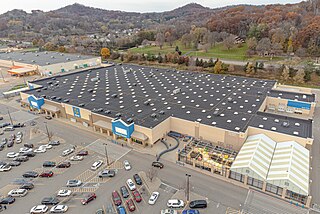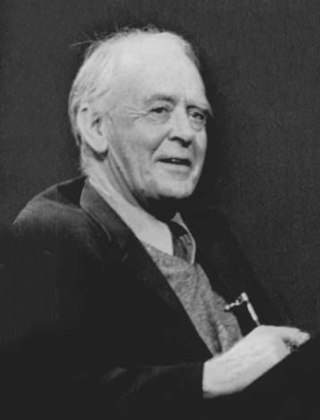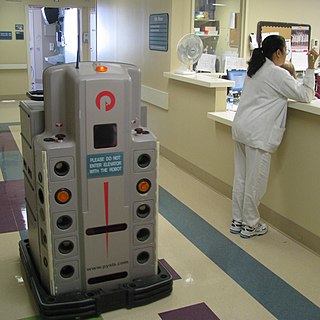
Macroeconomics is a branch of economics that deals with the performance, structure, behavior, and decision-making of an economy as a whole. This includes national, regional, and global economies. Macroeconomists study topics such as output/GDP and national income, unemployment, price indices and inflation, consumption, saving, investment, energy, international trade, and international finance.
A minimum wage is the lowest remuneration that employers can legally pay their employees—the price floor below which employees may not sell their labor. Most countries had introduced minimum wage legislation by the end of the 20th century. Because minimum wages increase the cost of labor, companies often try to avoid minimum wage laws by using gig workers, by moving labor to locations with lower or nonexistent minimum wages, or by automating job functions. Minimum wage policies can vary significantly between countries or even within a country, with different regions, sectors, or age groups having their own minimum wage rates. These variations are often influenced by factors such as the cost of living, regional economic conditions, and industry-specific factors.

Walmart Inc. is an American multinational retail corporation that operates a chain of hypermarkets, discount department stores, and grocery stores in the United States and 23 other countries. It is headquartered in Bentonville, Arkansas. The company was founded by brothers Sam and James "Bud" Walton in nearby Rogers, Arkansas in 1962 and incorporated under Delaware General Corporation Law on October 31, 1969. It also owns and operates Sam's Club retail warehouses.

Samuel Moore Walton was an American business magnate best known for founding the retailers Walmart and Sam's Club, which he started in Rogers, Arkansas and Midwest City, Oklahoma in 1962 and 1983 respectively. Wal-Mart Stores Inc. grew to be the world's largest corporation by revenue as well as the biggest private employer in the world. For a period of time, Walton was the richest person in the United States. His family has remained the richest family in the U.S. for several consecutive years, with a net worth of around US$240.6 billion as of January 2022. In 1992 at the age of 74, Walton died of blood cancer and was laid to rest at the Bentonville Cemetery in his longtime home of Bentonville, Arkansas.

Nicholas Kaldor, Baron Kaldor, born Káldor Miklós, was a Hungarian economist. He developed the "compensation" criteria called Kaldor–Hicks efficiency for welfare comparisons (1939), derived the cobweb model, and argued for certain regularities observable in economic growth, which are called Kaldor's growth laws. Kaldor worked alongside Gunnar Myrdal to develop the key concept Circular Cumulative Causation, a multicausal approach where the core variables and their linkages are delineated.

Sir John Richard Hicks was a British economist. He is considered one of the most important and influential economists of the twentieth century. The most familiar of his many contributions in the field of economics were his statement of consumer demand theory in microeconomics, and the IS–LM model (1937), which summarised a Keynesian view of macroeconomics. His book Value and Capital (1939) significantly extended general-equilibrium and value theory. The compensated demand function is named the Hicksian demand function in memory of him.

The American multinational retail chain Walmart has received criticism from parties such as labor unions and small town advocates for its policies and business practices.

Wal-Mart: The High Cost of Low Price is a 2005 documentary film by director Robert Greenwald and Brave New Films. The film presents a negative picture of Walmart's business practices through interviews with former employees, small business owners, and footage of Walmart executives. Greenwald also uses statistics interspersed between interview footage, to provide an objective analysis of the effects Walmart has on individuals and communities.
Walmarting or Walmartization is a neologism referring to U.S. discount department store Walmart with three meanings. The first use is similar to the concept of globalization and is used pejoratively by critics and neutrally by businesses seeking to emulate Walmart's success. The second, pejorative, use refers to the homogenization of the retail sector because of those practices. The third, neutral, use refers to the act of actually shopping at Walmart.
Walmart Watch, formed in the spring of 2005, was a joint project of the Center for Community and Corporate Ethics, a nonprofit organization studying the impact of large corporations on society, and its advocacy arm, Five Stones. The Walmart Watch group was based in Washington with the claimed goal to challenge Walmart to become a better employer, neighbor, and corporate citizen in order to improve the wages, health benefits, and treatment of workers.
Walmart Canada is a Canadian retail corporation and the Canadian branch of the U.S.-based multinational retail conglomerate Walmart. Headquartered in Mississauga, Ontario, it was founded on March 17, 1994, with the purchase of the Woolco Canada chain from the F. W. Woolworth Company.
Nelson Lichtenstein is an American historian. He is a professor of history at the University of California, Santa Barbara, and director of the Center for the Study of Work, Labor and Democracy. He is a labor historian who has written also about 20th-century American political economy, including the automotive industry and Wal-Mart.

Retailing in India is one of the pillars of its economy and accounts for about 10 percent of its GDP. The Indian retail market is estimated to be worth $1.3 trillion as of 2022. India is one of the fastest growing retail markets in the world, with 1.4 billion people.
Michael J. Hicks is the George & Frances Ball Distinguished Professor of Economics and director of the Center for Business and Economic Research and Professor of Economics at Ball State University.
The economic impact of illegal immigrants in the United States is challenging to measure and politically contentious. Research shows that illegal immigrants increase the size of the U.S. economy/contribute to economic growth, enhance the welfare of natives, contribute more in tax revenue than they collect, reduce American firms' incentives to offshore jobs and import foreign-produced goods, and benefit consumers by reducing the prices of goods and services.

Richard K. Vedder is an American economist, historian, author, and columnist. He is a professor emeritus of economics at Ohio University and senior fellow at The Independent Institute.

Technological unemployment is the loss of jobs caused by technological change. It is a key type of structural unemployment. Technological change typically includes the introduction of labour-saving "mechanical-muscle" machines or more efficient "mechanical-mind" processes (automation), and humans' role in these processes are minimized. Just as horses were gradually made obsolete as transport by the automobile and as labourer by the tractor, humans' jobs have also been affected throughout modern history. Historical examples include artisan weavers reduced to poverty after the introduction of mechanized looms. During World War II, Alan Turing's bombe machine compressed and decoded thousands of man-years worth of encrypted data in a matter of hours. A contemporary example of technological unemployment is the displacement of retail cashiers by self-service tills and cashierless stores.

Carl Douglas McMillon is an American businessman, and the president and chief executive officer (CEO) of Walmart Inc. He sits on the retailer's board of directors. Having first joined the company as a summer associate in high school, he became the company's fifth CEO in 2014. He previously led the company's Sam's Club division, from 2005 to 2009, and Walmart International, from 2009 to 2013.

Stephen Jonathan Machin is a British economist and professor of economics at the London School of Economics (LSE). Moreover, he is currently director of the Centre for Economic Performance (CEP) and is a fellow of the British Academy, the Society of Labor Economists and the European Economic Association. His current research interests include labour market inequality, the economics of education, and the economics of crime.
Alice Orcutt Nakamura is an American-Canadian economist and writer. She is a fellow of the Canadian Economics Association, which is the highest honour of the association. She is currently a professor of finance and management science at the University of Alberta where she has taught since 1972. Alice Nakamura was also the first female president of the Canadian Economics Association in 1994–1995. She was also the president of the International Association for Research on Income and Wealth from 2014 to 2016.












